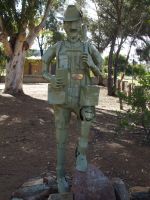Military History

The support given by the people of Moora – both at home and overseas – to Australia’s war effort between 1939 and 1945 was considerable. Men began to volunteer from 1940, leading to the formation of a Recruiting Committee in town, and several of Moora’s young women served as nurses during the hostilities. Twelve men from the Moora district were killed in action and others suffered as prisoners-of-war.
Soldiers
Moora itself played host to a large number of soldiers during World War II.
Their operational headquarters were at “Berkshire Valley”, where they took over all the farm buildings.
Numerous other units were stationed at places around the Moora district including the property “Woolawa”, the Moora sports ground and along the vulnerable coast west of Moora.
While the exact number of troops in the area at any one time is very hard to ascertain, some put the number as high as ‘30 000… camped in and around Moora’ in 1942.
The arrival of such large numbers of troops proved to be a boom to the commercial businesses and farmers alike, as a significant proportion of all materials and food supplies – meat, fruit, vegetables, eggs and milk – were purchased locally.
The movement of personnel and the large quantities of outside supplies helped the ailing Midland Railway.
One of the earliest war-related initiatives by the citizens of Moora was the formation of a local branch of the Australian Red Cross.
A public meeting was called by the road board the same month as war was declared and the sixty-three women and five men present at the gathering agreed to form the Moora branch.
During the war Red Cross members knitted socks, balaclavas and scarves and wound calico bandages for troops stationed in the area and for those in Perth hospitals and overseas.
The CWA was very active with its financial donations to various groups – the Polish and Finnish Relief Funds in 1939, the Red Cross, the War Relief Fund, the British Sailors Association and the Naval Welfare Fund and Comforts, and the Moora Girl Guides.
Raising Funds
A call for the further public support for the War Savings Campaign in 1940, met with an extremely positive response in Moora. Mr Hamilton approached the Moora Road Board soon afterwards with the idea of forming a specific War Savings Certificate.
Over 2000 subscriptions had been sent from the Moora area in 1941.
An ambulance was donated to Western Command for the war effort ‘by the people of the Moora Road Board District.’
The Round Hill Patriotic Fund was set up in June 1949 where meetings and other social events were held to raise funds as well as membership numbers.
Miling and the other centres held dances, concerts, card evenings and their Annual Sports Meetings to raise funds for the Red Cross and Comfort Funds.
A Spotters Club was formed at Miling to watch for enemy aircraft, and this was manned twenty four hours a day.
It was moved at a meeting of the Moora RSL in early 1940 that the branch form a Volunteer Defence Corps unit.
Members of the regular army stationed in the area and the local rifle clubs assisted with the training of these men.
By January of the following year, members had all received instruction in company drill, target practice and other instructive training.
War Rations
Stronger controls were placed on all Australians in 1941 as a result of Japan’s entry into the war. The whole nation was mobilised by means of special regulations. Prices were fixed, farmers were licensed and growing was organised. Production quotas were assessed and some farmers were told what and how much to produce.
Fuel rations were based on quotas and where shortages of equipment hindered production, the government set up a machinery pool so that contractors and farmers could gain access to the necessary articles.
Shortages of food articles such as butter, sugar and tea, clothing and petrol led to the rationing of those commodities during the war.
Although special fuel allowances were available to farmers, the amounts were still very restrictive so some growers found it prudent to put their tractors and trucks up on blocks until supplies (and prices) improved.
Agreements were made between the Federal Government and the United Kingdom with regard to the supply of wheat, lamb, beef, dairy products, fruit and wool to the latter country.
Britain bought the whole of the Australian wool clip during the war at a relatively good price, but drought and labour shortages did lead to a drop in production levels.
Also, the disruption to shipping caused by the war led to the stockpiling of wool and some grains, in Australia.
(Source: Chapter 9 ‘From the Wartime to Baby boom’ from the book A Track through the Midlands. By Maxine Laurie.)